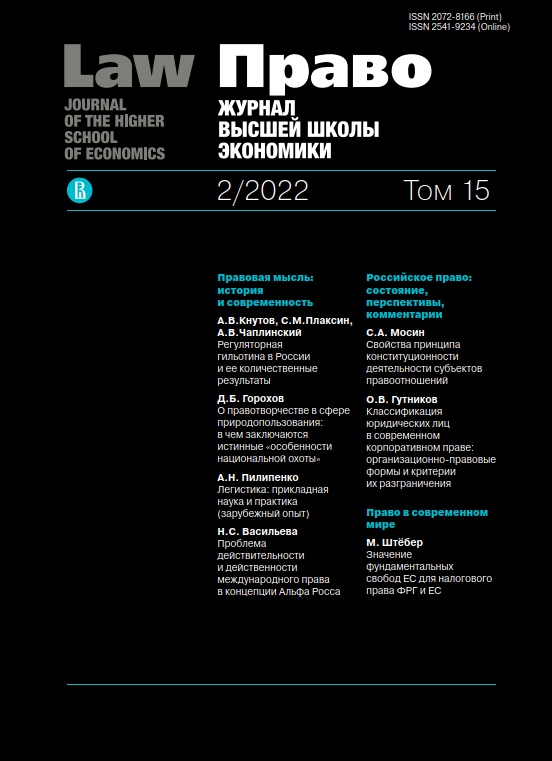On Law-Making in the Field of Nature Management: what Are True “Features of National Hunting”
Abstract
The article contains a scholar position regarding the recent legislative initiative implemented (June 2021), which has changed the legal regime of hunting grounds and the procedure for concluding hunting agreements as a basis for granting hunting grounds to private individuals for use and the right to carry out activities in the field of hunting, including the extraction of hunting resources. The position is formed on the basis of a comprehensive study conducted using formal legal and systematic methods, as well as methods of modeling and comparative jurisprudence. The analysis of the current legal regulation, norms at the stage of their design, new provisions of the Federal Law “On Hunting”, as well as factual circumstances is presented. It is concluded that the novelties that have changed the Federal Law mentioned do establish, in the interests of private individuals — hunting users, the regime of ownership, use and disposal of hunting grounds owned by the state on the right of ownership, and according to the actual consequences are aimed at the privatization of hunting grounds, their inclusion in civil turnover between private individuals, and together with the right of extraction of hunting resources and conducting other types of activities in the field of hunting. This violates the principle of priority of public interests in the field of nature management, and the purpose and true subject of legal regulation of the analyzed novels, including the method of their introduction into the legal system, have signs of “dubious legitimation” and have a hidden form, since hunting grounds are a single natural and immovable complex, are in state ownership and cannot be subject to turnover between private faces. The provision of hunting grounds on behalf of the State to private individuals should not be carried out except exclusively for use, which has a strictly defined purpose, reasonable time and personalized fulfillment of obligations, without the possibility of exercising the powers of the order. The procedure for the provision of hunting grounds by the state for the use of private individuals should be competitive, with the use of bidding, paid and public. The forecast of negative consequences of the result of changing the Federal Law “On Hunting” through the introduction of innovations in 2021 is given.
References
Anisimov A.P. (2013) Legal Regime of Hunting Grounds. Yuridicheskaya nauka = Legal Science, no 1, pp. 26-29 (in Russ.)
Belyaeva O.A. (2010) Legal Issues of Auctions and Competitions. Moscow: Jurisprudence, 297 p. (in Russ.)
Bogolyubov S.A. et al. (2007). Realization of Property Rights to Natural Resources. Moscow: Yurist, 240 p. (in Russ.)
Bogolyubov S.A., Khachaturov R.L. (ed.) (a) (2016). Monuments of the Russian Law. Vol. 25. Natural Resource and Environmental Legislation of the RSFSR. Moscow: Yurlitin-form, 448 p. (in Russ.)
Bogolyubov S.A., Khachaturov R.L. (ed.) (b) (2020) Formation and Development of Branches of Law in the Historical and Modern Legal Reality of Russia. Vol. 11. Environmental Law. Moscow: Yurlitinform, 392 p. (in Russ.)
Galinovskaya G.A., Ponomarev M.V. (2021) Strategic Planning in the Natural Resource Sphere: Legal Aspect. Pravo. Zhurnal Vysshey shkoly ekonomiki = Law. Journal of the Higher School of Economics, no. 2, pp. 65-86 (in Russ.) DOI: https://doi.org/10.17323/2072-8166.2021.2.65.86
Iutin I.G., Kichigin N.V., Pahareva G.V., Ponomarev M.V., Shirobokov A.S. (2011). Comment to the Federal Law of July 24, 2009 № 209-FZ “On Hunting and Conservation of Hunting Resources”. Moscow: Yustitsinform, 296 p. (in Russ.)
Ivanova S.V. (2018). Law and the Animal World: History and Modernity. Moscow: INFRA-M, 158 p. (in Russ.)
Khabrieva T. Ya. (ed.). (2012). Corruption: nature, types, counteraction. Moscow: Jurisprudence, 688 p. (in Russ.)
Minina E.L. (ed.) (2016). Legal Regulation of the Use and Protection of Biological Resources: a textbook. Moscow: INFRA-M, 328 p. (in Russ.)
Minina E.L. (a) (2021) Normative consolidation of the principles of Natural Resource Legislation. Zhurnal rossiyskogo prava = Journal of Russian Law, vol. 25, no 6, pp. 162177 (in Russ.) DOI: https://doi.org/10.12737/jrl.2021.081
Nozdrachev A.F. (ed.) (2020) Commentary to Chapter 8 of the Code of Administrative Offences of December 30, 2001, № 195-FZ “Administrative Offences in the field of Environmental Protection and Nature Management”. Moscow: INFRA-M, 472 p. (in Russ.) DOI: https://doi.org/10.12737/1080399
Shunaeva D.D. (2019) Digital economy and information support in the field of hunting. Zhurnal rossiyskogo prava = Journal of Russian Law, no 1, pp 159-169 (in Russ.)
Shupletsova Yu. I. (2020) Features of Legal Regulation of the use of Forests on Lands of various Categories. Zhurnal rossiyskogo prava = Journal of Russian Law, no 9, pp. 120-131 (in Russ.) DOI: https://doi.org/10.12737/jrl.2020.111
Sinitsyn S.A. (2021) Civil Law in Modern Socio-Economic Conditions. Zhurnal rossiyskogo prava = Journal of Russian Law, vol. 25, no 1, pp. 8-15 (in Russ.) DOI: https://doi.org/10.12737/jrl.2021.002
Tikhomirov Yu. A. (2018). Legal Forecasting. Moscow: Kontrakt, 168 p. (in Russ.)
Tikhomirov Yu. A., Talapina E.V. (2020) Law as an Effective Factor of Economic Development. Pravo. Zhurnal Vysshey shkoly ekonomiki = Law. Journal of the Higher School of Economics, no 1, pp. 4-26 (in Russ.) DOI: https://doi.org/10.17323/2072-8166.2020.1.4.26
Copyright (c) 2022 Law Journal of the Higher School of Economics

This work is licensed under a Creative Commons Attribution-ShareAlike 4.0 International License.


















